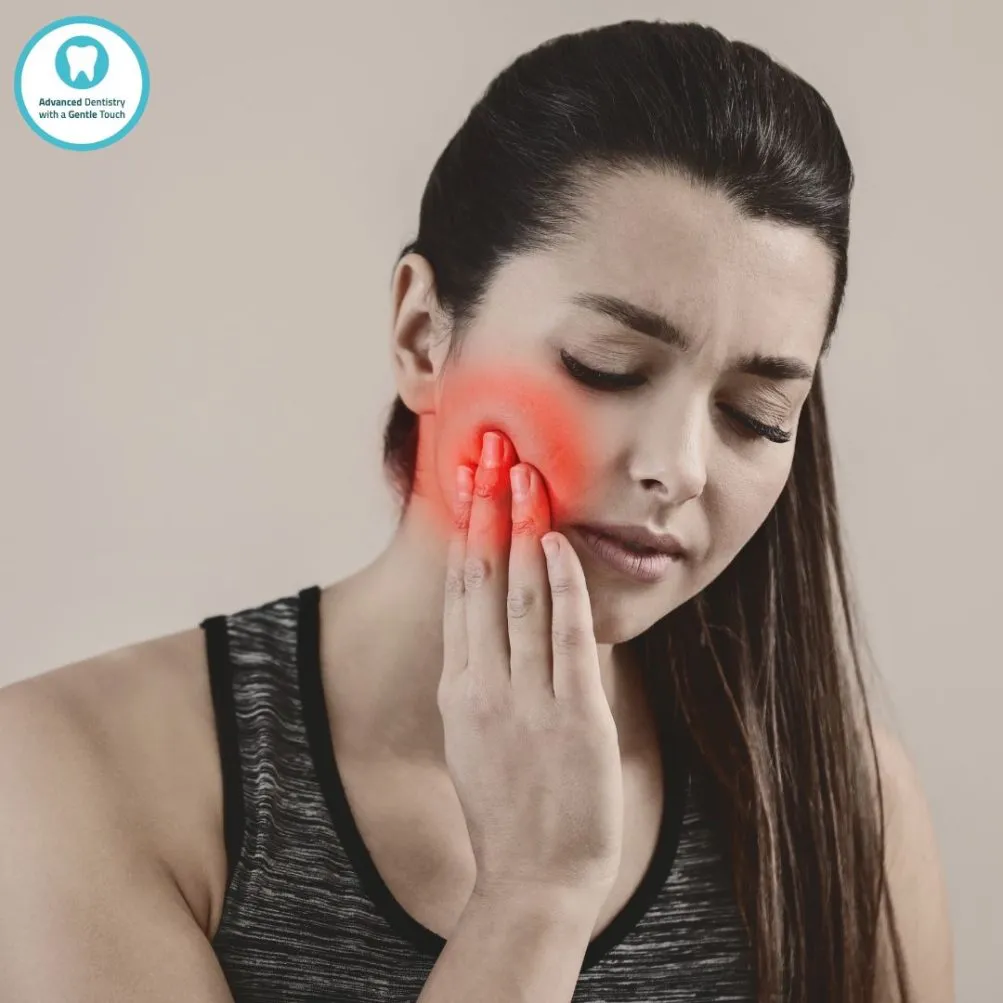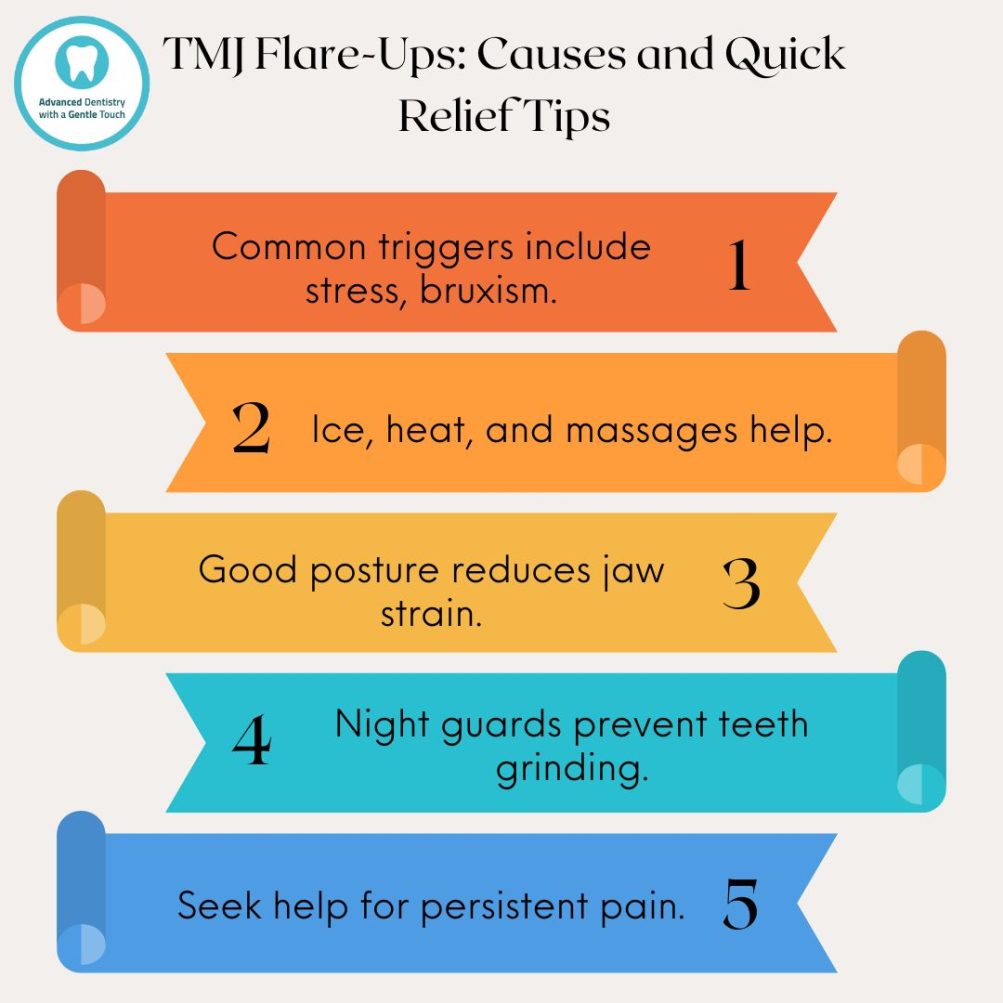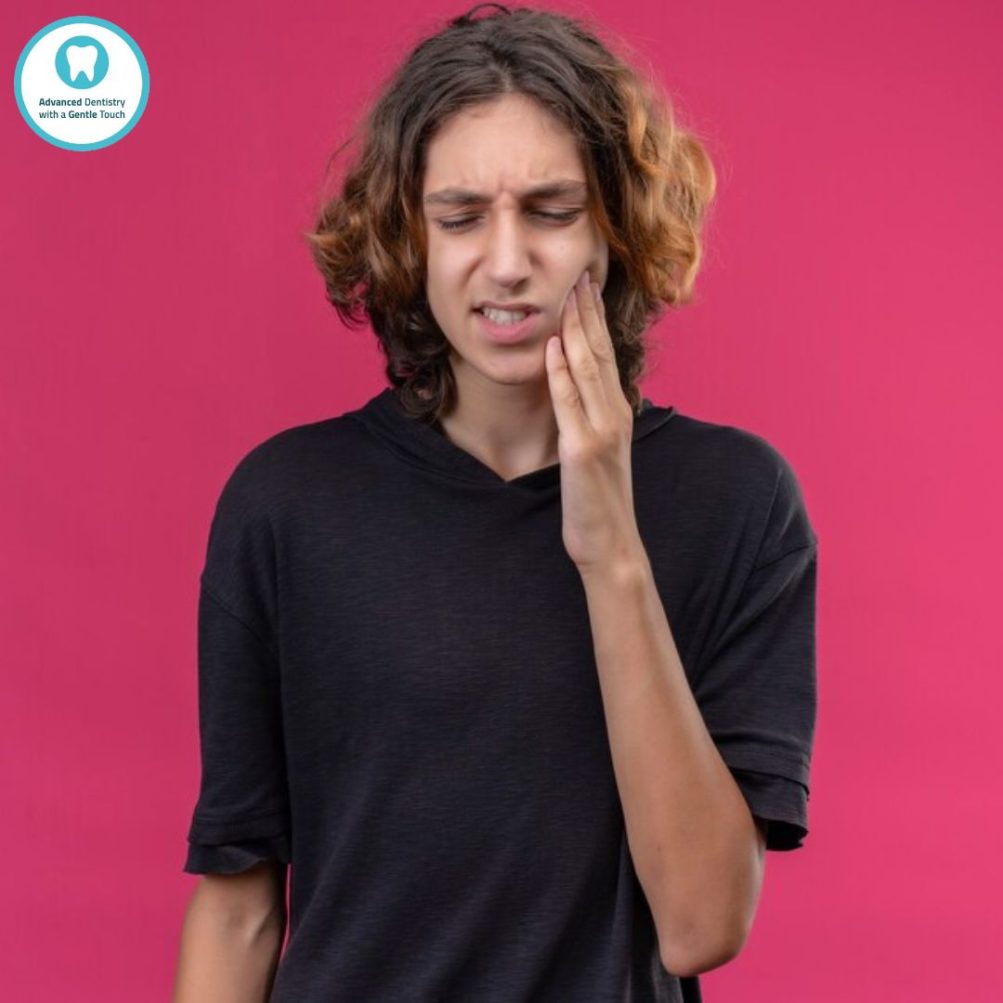TMJ Flare-Ups: Causes and Quick Relief Tips

TMJ flare-ups are sudden, intense episodes of jaw pain linked to the temporomandibular joint (TMJ). This joint connects the jaw to the skull, helping with movements like chewing and talking. Flare-ups are different from regular TMJ discomfort because they cause sharper, more disruptive pain that can make simple activities difficult.
During a flare-up, even basic tasks like eating or speaking may become uncomfortable. The pain may spread to the neck, head, or ears, limiting movement and affecting quality of life. Many people experience TMJ disorders, making it important to know how to stop jaw pain immediately and manage symptoms effectively.
This article will explain what triggers TMJ flare-ups and how to recognize the signs. It will also cover quick relief options and strategies to prevent future episodes. Whether you’ve had a TMJ headache or ear pain before, understanding these methods can help you take action and feel better faster.

Common Causes of TMJ Flare-Ups
Understanding what triggers TMJ flare-ups is key to managing and preventing them. These episodes often stem from physical issues, emotional stress, or lifestyle habits that strain the jaw. By recognizing the causes, you can take steps to avoid things that make TMJ worse and reduce the frequency of painful episodes.
Physical Causes
A jaw injury, arthritis, and teeth grinding (bruxism) are leading physical causes of TMJ flare-ups. An injury to the jaw can disrupt the alignment of the temporomandibular joint, causing pain and limiting movement. Arthritis, especially in the jaw joint, leads to inflammation that worsens TMJ symptoms. Bruxism, the habit of grinding teeth during sleep, places constant pressure on the joint, leading to soreness and stiffness.
Crooked jaws or misaligned teeth can also contribute to TMJ discomfort. When the bite doesn’t line up correctly, it puts extra strain on the TMJ during chewing or speaking. Additionally, habits like chewing gum frequently or eating hard foods can overstress the joint, triggering a flare-up. Limiting excessive chewing can help reduce the risk of sudden jaw pain.
Behavioral and Emotional Causes
Stress and anxiety play a major role in TMJ flare-ups. Clenching the jaw or tensing facial muscles, often done unconsciously, adds pressure to the joint. This tension can lead to TMJ headaches or ear pain. Managing stress through relaxation exercises or physical activity can help prevent these symptoms.
Poor posture is another factor that worsens TMJ. Misalignment of the neck and head shifts pressure to the jaw, contributing to pain and stiffness. Small habits, like biting nails or chewing on pens, may seem harmless but can strain the joint over time. Avoiding these behaviors can protect the TMJ and prevent flare-ups.
See also Velscope: Ways Your Dentist Can Save Your Life
Environmental and Lifestyle Factors
Environmental factors like cold weather can cause muscle tightness and stiffness in the jaw. Sleeping in awkward positions may strain the TMJ, leading to discomfort in the morning. Using supportive pillows and maintaining proper posture during sleep can help reduce jaw pain.
Lack of sleep, dehydration, and inflammation also increase the risk of TMJ flare-ups. Staying hydrated and getting enough rest supports joint health. Paying attention to these small lifestyle details can make a big difference in managing TMJ symptoms.

Quick Relief for TMJ Flare-Ups
TMJ flare-ups can cause sudden, intense discomfort, making it hard to eat, speak, or even relax. Finding relief quickly is essential to minimize pain and prevent further strain on the jaw. Simple at-home remedies, relaxation techniques, and dietary changes can help reduce symptoms and promote healing during these flare-ups.
At-Home Remedies
Applying ice or heat is one of the fastest ways to manage TMJ pain. Ice packs reduce inflammation, especially if the joint feels swollen or tender. Apply them for 10-15 minutes at a time. Heat is best for relaxing tense jaw muscles. A warm compress or heating pad applied to the side of the face can ease muscle stiffness and improve jaw movement.
Gentle jaw exercises and stretches can also help relieve pain. Slowly open and close the mouth or move the jaw side to side to loosen the joint. Try placing your tongue at the roof of your mouth and gently opening your jaw halfway to prevent overstretching. These exercises promote mobility and reduce tightness.
Massaging the jaw muscles can further ease tension. Use your fingertips to massage the area near the ears and along the jawline in small, circular motions. Focus on tight spots and apply light pressure to encourage relaxation. Regular massage reduces the intensity of TMJ flare-ups over time.
Over-the-counter pain relievers, like ibuprofen or naproxen, provide quick relief for flare-ups. These NSAIDs reduce inflammation and ease jaw pain. Use them as directed and avoid taking them for long periods without consulting a healthcare provider.
Relaxation Techniques
Stress often triggers TMJ flare-ups, making relaxation techniques essential. Deep breathing exercises can help relax the jaw. Breathe in slowly through the nose, hold for a few seconds, and exhale through the mouth. This method calms the body and reduces muscle tension.
See also Tooth-colored Fillings: Dental Composites
Meditation or mindfulness practices encourage awareness of jaw clenching. By staying mindful, you can notice when you’re tensing your jaw and actively relax it. Practicing mindfulness for a few minutes each day helps reduce the risk of flare-ups.
Diet Modifications
Eating soft foods minimizes strain on the joint during a TMJ flare-up. To avoid excessive chewing, opt for soups, smoothies, mashed potatoes, and yogurt. Foods that require little effort can prevent further irritation to the TMJ.
Avoid crunchy, hard, or chewy foods like nuts, gum, and tough meats. These foods can worsen TMJ symptoms and prolong pain. Sticking to a soft diet for a few days gives the jaw time to recover, reducing the chances of prolonged discomfort. By combining these approaches, you can effectively manage TMJ flare-ups at home and reduce the risk of recurring pain.

Preventing Future TMJ Flare-Ups
Preventing TMJ flare-ups starts with small changes in daily habits, stress management, and nighttime care. By being mindful of how you move, sit, and manage stress, you can reduce the risk of triggering jaw pain. Simple adjustments can protect the temporomandibular joint (TMJ) and improve overall comfort.
Daily Habits to Protect the TMJ
Good posture plays a key role in preventing TMJ discomfort. When using phones or computers, keep your head aligned with your spine and avoid tilting your chin forward. This reduces unnecessary strain on the jaw and neck.
Incorporate jaw stretches and regular movement breaks throughout the day. Gently open and close your mouth or move your jaw from side to side to keep the joint flexible. This prevents stiffness that could lead to flare-ups. Additionally, limit activities that put extra stress on the jaw, such as excessive gum chewing or biting nails. Reducing these habits protects the TMJ from overuse.
Stress Management
Managing stress is essential for preventing TMJ-related tension. Regular exercise, yoga, or relaxation techniques like deep breathing help reduce overall muscle tension. Yoga not only promotes flexibility but also encourages jaw relaxation, lowering the chances of clenching.
Finding time for activities that help you unwind can decrease the frequency of TMJ flare-ups. Meditation, guided relaxation, and spending time outdoors are simple ways to manage stress effectively.
Nighttime Protection
Wearing a night guard can prevent teeth grinding or clenching during sleep, one of the common causes of TMJ pain. A custom-fitted guard protects the jaw by reducing pressure on the TMJ, promoting better alignment and muscle relaxation overnight.
See also Dr. Korwin Thanks His Patients
Additionally, improving sleep posture helps. Avoid sleeping on your stomach or with your hand under your chin, as these positions put pressure on the jaw. A supportive pillow can keep the neck aligned, minimizing strain and protecting the TMJ.

When to Seek Professional Help
Most TMJ flare-ups can be handled at home, but some signs mean you should see a professional. If your jaw pain doesn’t go away or gets worse, or if you have trouble opening or closing your mouth, it may be time for treatment. A locking jaw, constant headaches, or ear pain that doesn’t improve also need attention.
You can visit a dentist, physical therapist, or TMJ expert if symptoms last too long. Dentists check for jaw problems and suggest treatments. Physical therapists show exercises to help your jaw move better. TMJ experts in New Jersey can give more advanced care if needed.
Doctors may use X-rays or MRIs to look at your jaw and find any swelling or alignment problems. These tests help them understand what is causing the pain and how to fix it.
Treatments can include therapy, dental work, or Botox to relax tight jaw muscles. In rare cases, surgery may be needed, but most people feel better with simple treatments. Getting help early can stop the problem from getting worse and make daily life easier.
Conclusion
TMJ flare-ups can happen for many reasons, including jaw injury, teeth grinding, stress, and poor posture. These flare-ups can make daily tasks like eating and speaking painful. Finding quick relief with simple remedies, like ice, heat, and gentle jaw exercises, can help ease discomfort and improve mobility.
Preventing flare-ups is just as important as treating them. By practicing good posture, managing stress, and avoiding habits that strain the jaw, you can reduce the frequency and severity of TMJ symptoms. Wearing a night guard, staying hydrated, and getting enough rest also play a role in keeping the jaw healthy.
If you experience frequent or severe TMJ flare-ups, don’t ignore the signs. Take action by trying at-home remedies, but seek professional advice if the pain continues or worsens. A dentist, physical therapist, or TMJ expert can offer treatments that provide long-term relief.
Don’t wait for a TMJ flare-up to disrupt your life. Start making small changes today and get the help you need to manage your symptoms effectively.
